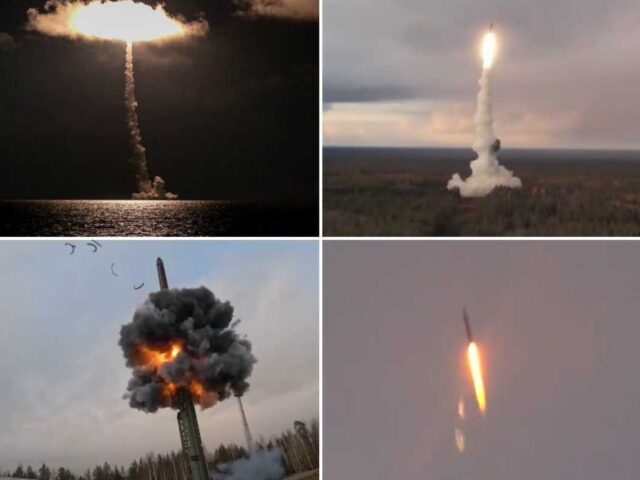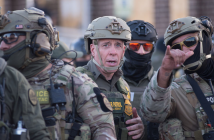“Important to have modern and constantly ready-to-use strategic forces” says Vladimir Putin as Russia rattles its sabre with tests meant to simulate a “massive nuclear strike”.
Russia says it has launched a large scale nuclear exercise, which they claim included flying a land-launched missile over 3,500 miles across the country as well as submarine launches and strategic bombers. The Kremlin has now published video footage of several tests that took place Tuesday, with senior figures making the purpose of the exercises.
Defence Minister Andrei Belousov said the purpose of the launches was practising “a massive nuclear strike by strategic offensive forces in response to a nuclear strike by the enemy”, a clear warning to the West that follows now-years of heightened nuclear talk as Moscow moves to dissuade the U.S. and allies from becoming further involved in its invasion of Ukraine.
Meanwhile Russian President Vladimir Putin said that although he didn’t want to see the country “involved in a new arms race”, nevertheless “we will maintain nuclear forces at the level of necessary sufficiency” and new launch systems and missiles were being developed. These would sharpen Russia’s response times by being faster to launch, and would have new capabilities to evade missile defence screens, it was asserted, even if nuclear weapons are an “extremely exceptional measure”.
Putin further remarked of the exercising of his Strategic Deterrent Forces: “Given the growing geopolitical tensions and the emergence of new external threats and risks, it is important to have modern and constantly ready-to-use strategic forces”.
The launches were concentrated around the extreme north-west, and the extreme east of Russia. In the case of a Yars ICBM launch test, Russian state media asserts it began at the the ‘Plesetsk state test cosmodrome’ near Archangesk on the White Sea, the missile flying across the north of the country some 3,500 miles to the ‘Kura test site in Kamchatka’, the Peninsula in far-eastern Russia on the Bering Sea and Sea of Okhotsk.
The seaborne missile tests Sineva and Bulava ballistic missiles were also, broadly speaking in the enormous geographic terms of the vast Russian federation, in these neighbourhoods. The test of one submarine-launch nuclear missile was from the Barents Sea, the Arctic-circle Atlantic fringe waters north of the White Sea from the nuclear submarine Novomoskovsk. The other was from Russia’s Pacific coast, launched by the Knyaz Oleg nuclear submarine from the Sea of Okhotsk.
Russia also published footage of a series of “Tu-95MS strategic missile carrier” strategic bombers taxiing and taking off.
At the same time, but not officially linked, South Korea has warned that North Korea — now a closer Russian ally as the two collaborate over the Ukraine War — was preparing for nuclear and missile tests of its own.
Moscow has drilled its nuclear forces in recent years, including in 2024, 2023, and 2022, but this week’s latest series of tests comes shortly after the country announced a change in its nuclear doctrine earlier this year. Under the new rules as articulated by President Putin, ” aggression against Russia by any non-nuclear state, but “with the participation or support” of a nuclear one, should be considered a joint attack”. Further, Russia said it could use nuclear weapons even against a non-nuclear threat, if such an attack against Russia or Belarus constituted a “critical threat to sovereignty”.
The West has also exercised its nuclear deterrent this year. NATO held its annual nuclear drills as normal earlier this month with Operation Steadfast Noon, involving eight military bases, 2,000 personnel and 60 aircraft from 13 nations and focussed on the North Sea.
Continue reading: Breitbart.com





Leave a Reply